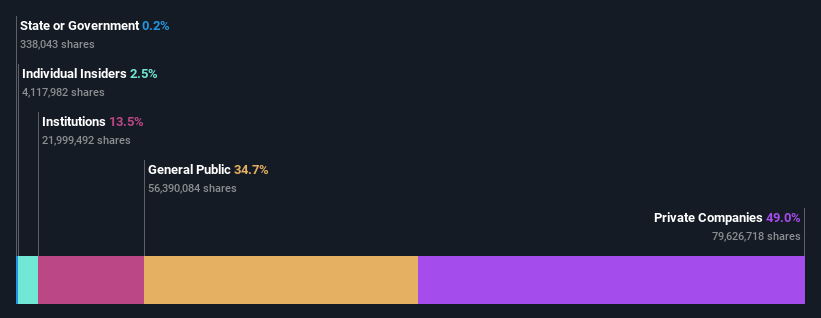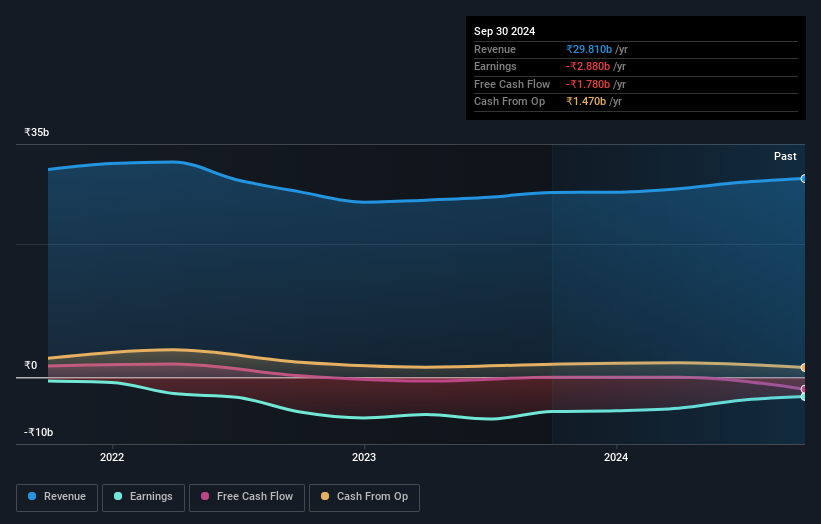Private companies in Wockhardt Limited (NSE:WOCKPHARMA) are its biggest bettors, and their bets paid off as stock gained 5.6% last week

Key Insights
- The considerable ownership by private companies in Wockhardt indicates that they collectively have a greater say in management and business strategy
- The top 5 shareholders own 52% of the company
- Institutional ownership in Wockhardt is 14%
To get a sense of who is truly in control of Wockhardt Limited (NSE:WOCKPHARMA), it is important to understand the ownership structure of the business. The group holding the most number of shares in the company, around 49% to be precise, is private companies. Put another way, the group faces the maximum upside potential (or downside risk).
Clearly, private companies benefitted the most after the company's market cap rose by ₹12b last week.
Let's delve deeper into each type of owner of Wockhardt, beginning with the chart below.
View our latest analysis for Wockhardt

What Does The Institutional Ownership Tell Us About Wockhardt?
Institutional investors commonly compare their own returns to the returns of a commonly followed index. So they generally do consider buying larger companies that are included in the relevant benchmark index.
We can see that Wockhardt does have institutional investors; and they hold a good portion of the company's stock. This can indicate that the company has a certain degree of credibility in the investment community. However, it is best to be wary of relying on the supposed validation that comes with institutional investors. They too, get it wrong sometimes. When multiple institutions own a stock, there's always a risk that they are in a 'crowded trade'. When such a trade goes wrong, multiple parties may compete to sell stock fast. This risk is higher in a company without a history of growth. You can see Wockhardt's historic earnings and revenue below, but keep in mind there's always more to the story.

Wockhardt is not owned by hedge funds. The company's largest shareholder is Humuza Consultants, with ownership of 40%. The second and third largest shareholders are Lysithea Consultants and HNZ Consultants, with an equal amount of shares to their name at 3.1%.
Our research also brought to light the fact that roughly 52% of the company is controlled by the top 5 shareholders suggesting that these owners wield significant influence on the business.
While it makes sense to study institutional ownership data for a company, it also makes sense to study analyst sentiments to know which way the wind is blowing. As far as we can tell there isn't analyst coverage of the company, so it is probably flying under the radar.
Insider Ownership Of Wockhardt
The definition of an insider can differ slightly between different countries, but members of the board of directors always count. Management ultimately answers to the board. However, it is not uncommon for managers to be executive board members, especially if they are a founder or the CEO.
I generally consider insider ownership to be a good thing. However, on some occasions it makes it more difficult for other shareholders to hold the board accountable for decisions.
We can see that insiders own shares in Wockhardt Limited. This is a big company, so it is good to see this level of alignment. Insiders own ₹5.7b worth of shares (at current prices). Most would say this shows alignment of interests between shareholders and the board. Still, it might be worth checking if those insiders have been selling.
General Public Ownership
The general public, who are usually individual investors, hold a 35% stake in Wockhardt. While this size of ownership may not be enough to sway a policy decision in their favour, they can still make a collective impact on company policies.
Private Company Ownership
We can see that Private Companies own 49%, of the shares on issue. Private companies may be related parties. Sometimes insiders have an interest in a public company through a holding in a private company, rather than in their own capacity as an individual. While it's hard to draw any broad stroke conclusions, it is worth noting as an area for further research.
Next Steps:
I find it very interesting to look at who exactly owns a company. But to truly gain insight, we need to consider other information, too. Consider risks, for instance. Every company has them, and we've spotted 1 warning sign for Wockhardt you should know about.
Of course this may not be the best stock to buy. Therefore, you may wish to see our free collection of interesting prospects boasting favorable financials.
NB: Figures in this article are calculated using data from the last twelve months, which refer to the 12-month period ending on the last date of the month the financial statement is dated. This may not be consistent with full year annual report figures.
Valuation is complex, but we're here to simplify it.
Discover if Wockhardt might be undervalued or overvalued with our detailed analysis, featuring fair value estimates, potential risks, dividends, insider trades, and its financial condition.
Access Free AnalysisHave feedback on this article? Concerned about the content? Get in touch with us directly. Alternatively, email editorial-team (at) simplywallst.com.
This article by Simply Wall St is general in nature. We provide commentary based on historical data and analyst forecasts only using an unbiased methodology and our articles are not intended to be financial advice. It does not constitute a recommendation to buy or sell any stock, and does not take account of your objectives, or your financial situation. We aim to bring you long-term focused analysis driven by fundamental data. Note that our analysis may not factor in the latest price-sensitive company announcements or qualitative material. Simply Wall St has no position in any stocks mentioned.
About NSEI:WOCKPHARMA
Wockhardt
A pharmaceutical and biotech company, manufactures and trades pharmaceuticals, medicinal, botanical, and chemical products in India, the United States, the United Kingdom, Switzerland, Ireland, Russia, Europe, and internationally.
Adequate balance sheet minimal.
Similar Companies
Market Insights
Community Narratives



